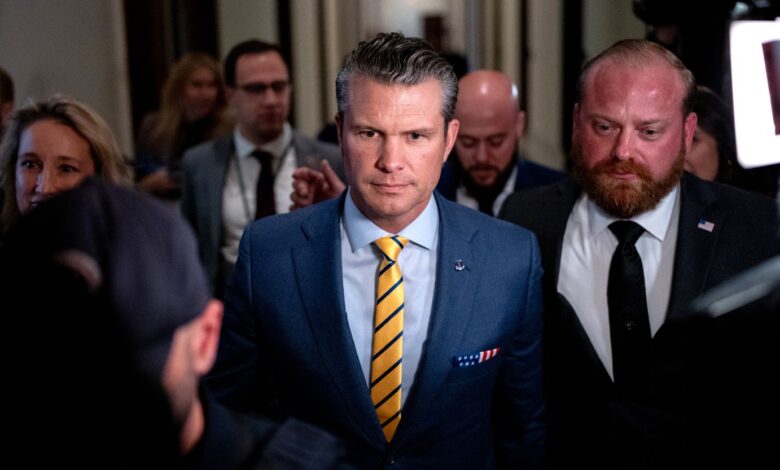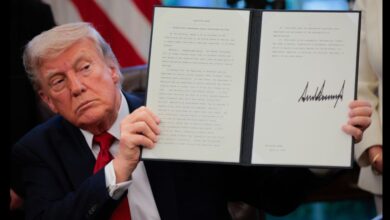Hegseth Disclosed Secret War Plans in a Group Chat

The Atlantic magazine’s editor in chief has insisted he saw “minute-by-minute accounting” of how the US intended to bomb Yemen — despite Defense Secretary Pete Hegseth adamantly denying that sensitive war plans were ever discussed in the bombshell group text scandal.
The mag’s top editor, Jeffrey Goldberg, revealed Monday that he was inadvertently included in a Signal message chain earlier this month in which top Trump administration officials — including Hegseth and Vice President JD Vance — discussed strikes against the Houthi terror group in Yemen.
In an interview with MSNBC’s “Inside with Jen Psaki” just hours after the stunning breach of national security surfaced, Goldberg doubled down — claiming he saw a play-by-play of “what was about to happen” with the strikes.
The Atlantic magazine’s editor in chief, Jeffrey Goldberg, has insisted he saw a “minute-by-minute accounting” of how the US intended to bomb Yemen.
“Look, I’m going to be responsible here and not disclose the things that I read and saw. I will describe them to you,” Goldberg said.
“The specific time of a future attack; specific targets, including human targets meant to be killed in that attack; weapon system; even weather reports.
“I mean, the precise detail, and then a long section on sequencing: ‘This is gonna happen, then that is gonna happen. After that happens, this happens, then that happens, and then we go and find out if it worked,’” he added.
Pete Hegseth claims ‘nobody was texting war plans’ in first comments since Yemen strike group text scandal
Goldberg hit back after Hegseth poured cold water on the editor’s reporting, arguing that sensitive “war plans” were not being discussed in the Signal chat group and that the editor had a history of being “deceitful” and was “highly discredited.”
“I mean, you know, he can say that it wasn’t a war plan, but it was a minute-by-minute accounting of what was about to happen, organized by CENTCOM, Central Command, which is the military oversight group of the Middle East, the broader Middle East,” Goldberg said.
“It’s interesting because as I’m reading it at 11:44 a.m. on Saturday morning, the 15th, seeing that the Houthis are not going to know about this for another couple of hours, and I know about it, and I’m thinking to myself, I mean, honestly, I’m thinking to myself, well, I’m glad that Mike Waltz didn’t invite a Houthi into the group or a Russian spy or an adversary of the United States,” he continued.
He claimed he saw a play-by-play of “what was about to happen” with the strikes after Pete Hegseth argued sensitive “war plans” were not being discussed in the Signal chat group.
Goldberg had earlier revealed he was added to the Signal chain, titled “Houthi PC small group,” on March 11 — before the strikes in Yemen were carried out on March 15.
He noted that he received the Signal invitation from Trump’s national security adviser, Mike Waltz.
Just hours after the saga spilled into public view, Hegseth attacked Goldberg as “deceitful” and a “discredited so-called journalist” while alluding to previous reporting critical of Trump from the publication.
The leaked messages made the front page of the New York Post.
Hegseth tried to pour cold water Goldberg’s reporting and discredit him, arguing that sensitive “war plans” were not being discussed in the Signal chat group and that the editor had a history of being “deceitful and highly discredited.”
Hegseth tried to pour cold water on Goldberg’s reporting and discredit him, arguing that sensitive “war plans” were not being discussed in the Signal chat group and that the editor had a history of being “deceitful and highly discredited.”
He stopped short, though, of explaining why Signal was being used to discuss the sensitive operation — or how Goldberg ended up on the message chain.
“Nobody was texting war plans, and that’s all I have to say about that,” Hegseth said.
National Security Council spokesman Brian Hughes told The Post the Signal chain that included Goldberg “appears to be an authentic message chain” and that officials were reviewing how an “inadvertent number” was added to the chain.
Meanwhile, White House spokeswoman Karoline Leavitt insisted that the president still has the “utmost confidence” in Waltz and the national security team despite the saga.




